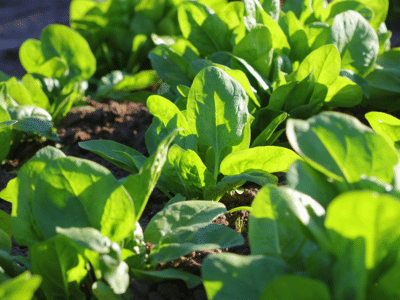Doctors and nutritionists have long urged us to pile our plates with vegetables, but one leafy green has earned a special place in the longevity hall of fame. Spinach, often overlooked in favor of trendier superfoods, packs a nutritional punch so powerful that experts say it could help add years to your life. From fighting inflammation to protecting your brain, this everyday green is a wellness powerhouse — and the best part is, you can even grow it right at home.
Why spinach tops the longevity chart
Spinach is loaded with antioxidants such as vitamin C, lutein, and zeaxanthin, which nutritionist Umo Callins, M.S., RD, CSSD, LD, CPT, says can help fight free radicals and reduce inflammation, a key factor in aging.
Jamie Nadeau, RD, LDN, points out another major benefit — spinach is rich in nitrates that support healthy blood pressure. It also offers cancer-fighting compounds like beta carotene, flavonols, and phytochemicals. Studies have linked regular spinach consumption with reduced risks of chronic illnesses, including heart disease and certain cancers.
Spinach also supports gut health thanks to its high fiber content, particularly when cooked. According to research, its carotenoids are associated with greater diversity in the gut microbiome, another longevity marker.
When it comes to brain health, Maggie Moon, M.S., RD, notes that spinach’s folate, antioxidants, and phytochemicals help slow age-related cognitive decline. One study even found that diets rich in leafy greens were linked with better cognitive function over time.
Easy ways to add spinach to your meals
Spinach’s mild flavor makes it incredibly versatile. You can:
According to a guide by All That Grows, spinach is easy to cultivate in balconies, terraces, or even containers. The steps are simple:
Choose a spot with a balance of sunlight and shade, and use well-drained, nutrient-rich soil with a pH of 6.5–7. Sow seeds half an inch deep, leaving 3–4 inches between them. Keep the soil moist (but not soggy) and water in the mornings. Watch for pests like aphids or cutworms, using natural remedies like neem oil if needed. Most spinach varieties are ready to harvest within 45–60 days. Cut leaves from the outside in for smaller needs, or harvest the entire plant to allow regrowth. With regular care, your balcony spinach patch can provide fresh leaves for salads, smoothies, and sautés throughout the season. Freshly harvested spinach can be stored for up to two weeks in the fridge if washed and properly packed.

Variety matters for longevity
While spinach leads the pack, experts stress that mixing up your vegetable intake is key. Other leafy greens like arugula and romaine, and colorful picks like beets and purple cabbage, offer their own anti-inflammatory and antioxidant benefits.
Making spinach a regular part of your diet is a simple step toward better health, supporting your heart, gut, and brain while reducing disease risk. And with a little effort, you can enjoy it freshly picked from your own home garden — no farmland required. In the quest for a longer, healthier life, this leafy green proves that sometimes the most powerful superfoods are the ones growing quietly in your own backyard.
Why spinach tops the longevity chart
Spinach is loaded with antioxidants such as vitamin C, lutein, and zeaxanthin, which nutritionist Umo Callins, M.S., RD, CSSD, LD, CPT, says can help fight free radicals and reduce inflammation, a key factor in aging.
Jamie Nadeau, RD, LDN, points out another major benefit — spinach is rich in nitrates that support healthy blood pressure. It also offers cancer-fighting compounds like beta carotene, flavonols, and phytochemicals. Studies have linked regular spinach consumption with reduced risks of chronic illnesses, including heart disease and certain cancers.
Spinach also supports gut health thanks to its high fiber content, particularly when cooked. According to research, its carotenoids are associated with greater diversity in the gut microbiome, another longevity marker.
When it comes to brain health, Maggie Moon, M.S., RD, notes that spinach’s folate, antioxidants, and phytochemicals help slow age-related cognitive decline. One study even found that diets rich in leafy greens were linked with better cognitive function over time.
Easy ways to add spinach to your meals
Spinach’s mild flavor makes it incredibly versatile. You can:
- Sauté it with garlic and protein like eggs or shrimp
- Blend it into smoothies
- Use it as a salad base with vitamin C-rich toppings for better iron absorption
- Add it fresh to sandwiches or wraps
- Keep frozen spinach handy for soups and stir-fries without losing nutritional value
According to a guide by All That Grows, spinach is easy to cultivate in balconies, terraces, or even containers. The steps are simple:
Variety matters for longevity
While spinach leads the pack, experts stress that mixing up your vegetable intake is key. Other leafy greens like arugula and romaine, and colorful picks like beets and purple cabbage, offer their own anti-inflammatory and antioxidant benefits.
Making spinach a regular part of your diet is a simple step toward better health, supporting your heart, gut, and brain while reducing disease risk. And with a little effort, you can enjoy it freshly picked from your own home garden — no farmland required. In the quest for a longer, healthier life, this leafy green proves that sometimes the most powerful superfoods are the ones growing quietly in your own backyard.
You may also like

Janmashtami 2025 Bhog: Just offer these two bhogs on Janmashtami, Kanha will be happy..

What prompted Peter Andre's furious statement at ex-wife Katie Price

'Good value' portable neck fan is shoppers' 'favourite purchase' for heatwave

Ruben Amorim 'will have performed brilliantly well' if he repeats Mikel Arteta's Arsenal feat

Iceland shoppers ask 'is this real' as store makes £4 announcement






